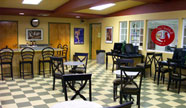
A new study by IAC and JWT, two large internet advertising agencies, have announced a new study detailing the rise of the "Young Digital Mavens" demographics in the United States and China.
"The study found that while a large majority of youth in both countries now feel dependent on digital technology, this attitude is especially pronounced in China. As many as 80 percent of Chinese respondents agreed that 'Digital technology is an essential part of how I live,' compared with 68 percent of Americans. The Internet is such a vital part of life for Chinese youth that they are twice as likely as young Americans to say they would not feel OK going without Internet access for more than a day (25 percent vs. 12 percent). And more than twice as many Chinese youth admitted they sometimes feel 'addicted' to living online: 42 percent vs. 18 percent of Americans.
"'The Chinese people seem to be way ahead of Americans in living a digital life,' noted IAC Chairman and CEO Barry Diller today in Beijing, where he spoke to more than 350 Chinese students at Peking University. 'More activity online means a more connected and a more evolved workforce - just what China needs as it makes its move from being the workshop of the world, to a developed economy in its own right.'
"'Like many other areas in comparing Americans to the energy and progress elsewhere in the world, China's speedy evolution in its use of the internet is fast eclipsing that of the US. I think this is great for China, not so great for us,' Diller added."
A more detailed report of this study is available as a press release at China Leads the US in Digital Self-Expression, CNNMoney, November 23, 2007. http://money.cnn.com/news/newsfeeds/articles/prnewswire/NYF00723112007-1.htm
http://iac.com.
http://jwt.com
AP image of a internet cafe in Beijing from Time Magazine, September 11, 2006. http://img.timeinc.net/time/asia/magazine/2006/0918/internet_cafe.jpg. Photographer Gregg Baker/AP. Caption: Sociologists worry that Internet overexposure could be harmful to China's youth



